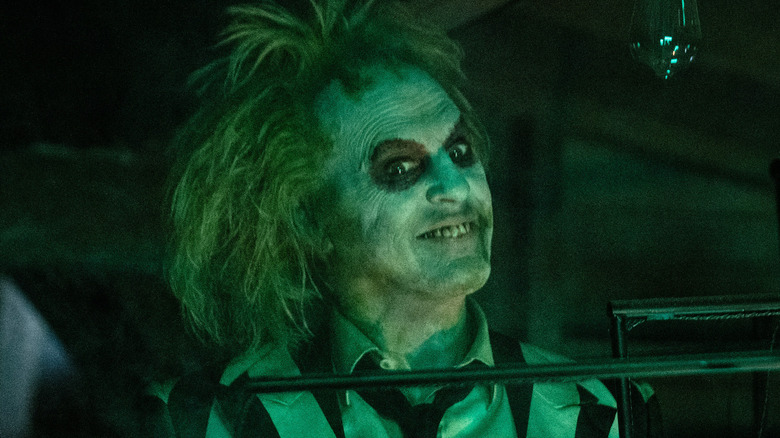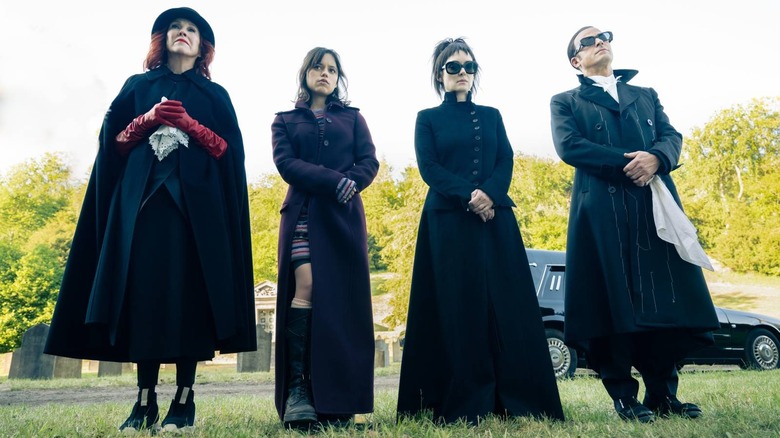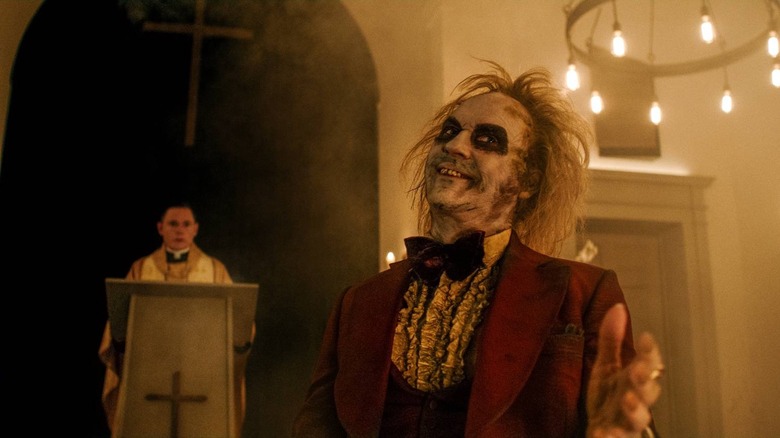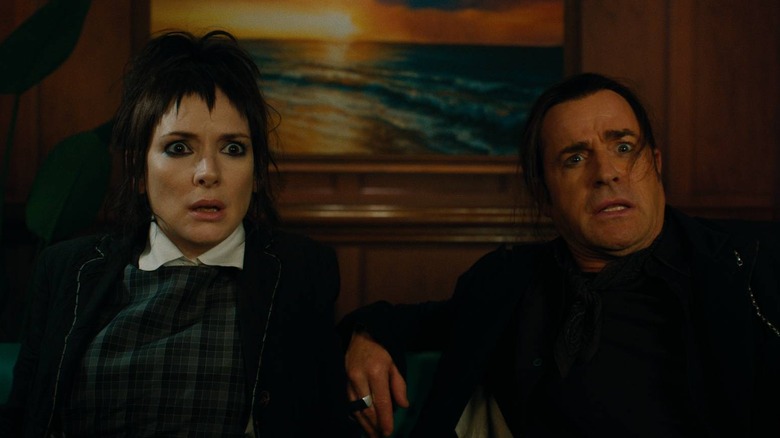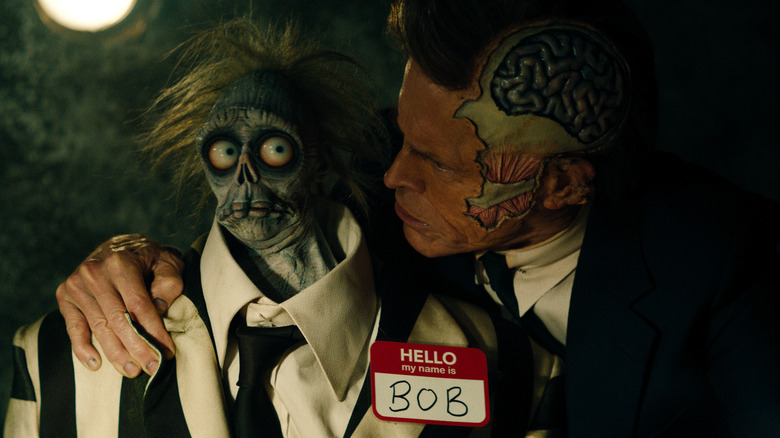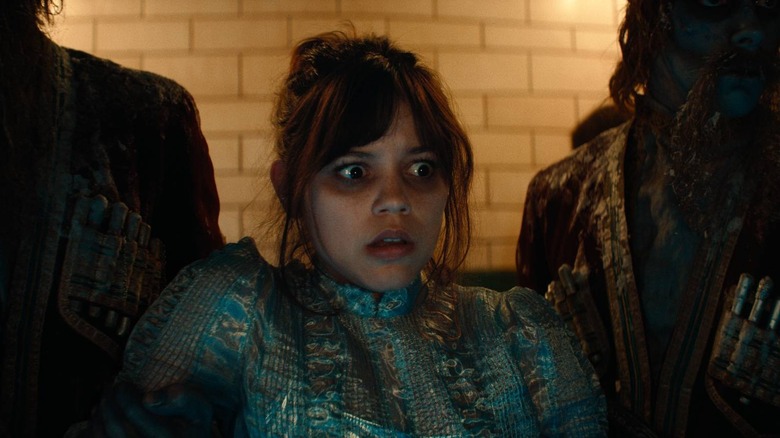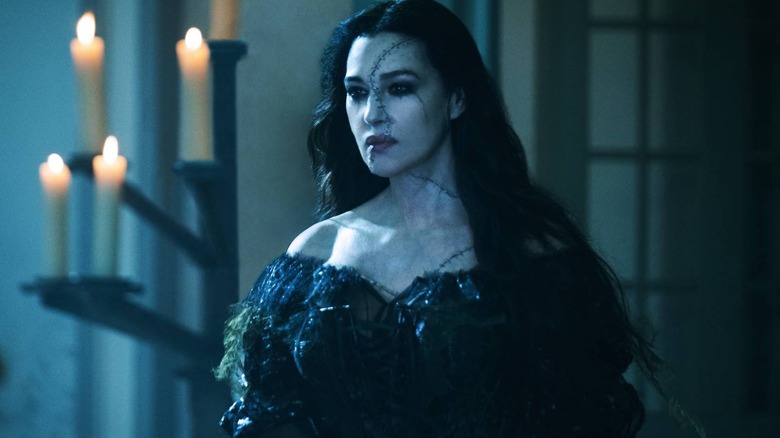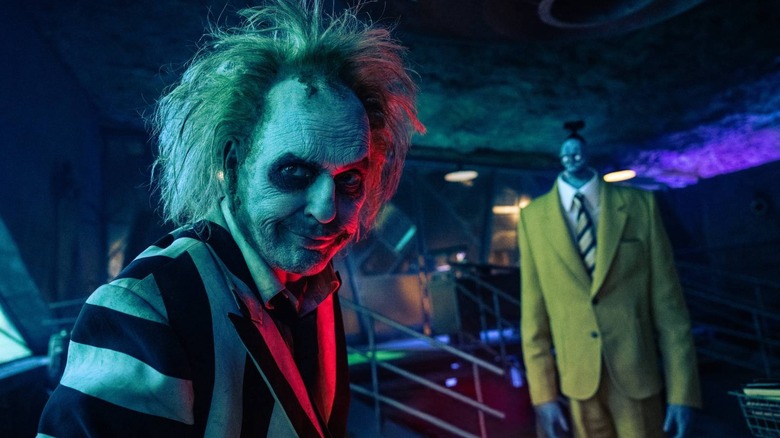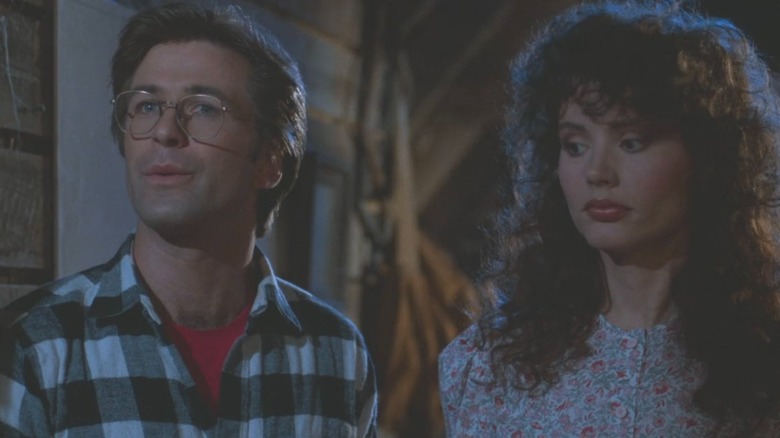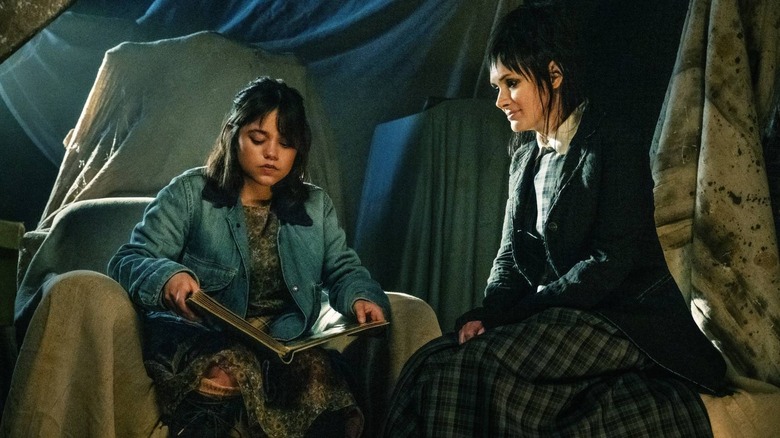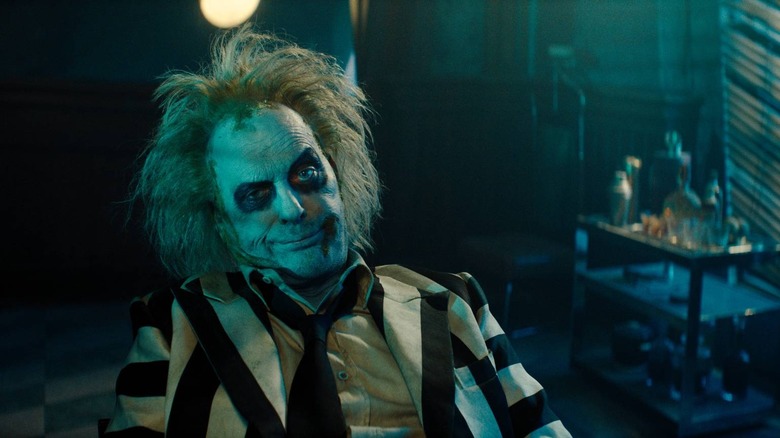The Ending Of Beetlejuice Beetlejuice Explained
Contains spoilers for "Beetlejuice Beetlejuice"
By the end of 1988's "Beetlejuice," it became abundantly clear that an exciting new voice was emerging in Hollywood in the form of director Tim Burton. The film had a unique, macabre tone that was still accessible to the masses and introduced beloved new characters into the zeitgeist, chief among them the titular "bio-exorcist" (Michael Keaton). Burton went on to bring his unique style, blending German Expressionism with surrealism, to the masses in everything from his "Batman" movies to "Sweeney Todd: The Demon Barber of Fleet Street," but many wondered if a return to the world of "Beetlejuice" was ever possible.
36 years later, we have our answer with "Beetlejuice Beetlejuice." The film picks up with most of the characters decades after the first film: Lydia Deetz (Winona Ryder) now has a daughter of her own, Astrid (Jenna Ortega), who wants nothing to do with her. Meanwhile, Beetlejuice is still a lingering presence while dealing with problems of his own, namely an ex-wife, Delores (Monica Belluci), who wants to suck the soul out of him as revenge for how he killed her on Earth.
Between all of this is plenty of dark humor, some stop-motion animation, and a surprising amount of heart. But how's everyone doing by the end of "Beetlejuice Beetlejuice"? Here's what to know and what it could mean for a potential threequel — which would almost certainly need to be called "Beetlejuice Beetlejuice Beetlejuice."
What you need to remember about the plot of Beetlejuice Beetlejuice
Following the death of Charles Deetz (Jeffrey Jones in the original film), Lydia and her mom Delia (Catherine O'Hara) go to pick up Astrid from boarding school. Astrid is estranged from her mother, believing she's faking her ability to commune with the dead on her TV show, "Ghost House," because she's never communed with her late husband, Richard (Santiago Cabrera). Of course, Lydia's powers are all too real, and lately, she's been haunted by visions of Beetlejuice. Following the funeral, which takes place at their old house in Winter River, Astrid goes for a bike ride, meeting a young man named Jeremy (Arthur Conti) and striking up a relationship with him.
Meanwhile, in the afterlife, Delores pulls herself together (literally) after being locked away to get vengeance on Beetlejuice, whom she married while alive with the intention of killing him as part of a death cult. However, Beetlejuice killed her before succumbing to poison. As a soul sucker, however, she can kill people for good, even if they're already dead. Delores' body count catches the attention of Wolf Jackson (Willem Dafoe), an actor-turned-detective, who lets Beetlejuice know his ex is running amok and likely targeting him.
It turns out Jeremy is already dead and wants to use Astrid as a loophole to return to life, while sending her to the Great Beyond in the process. Lydia, in desperation, calls upon Beetlejuice to help her rescue Astrid from the afterlife, to which Beetlejuice agrees — on the condition that Lydia marries him. Some things never change with the Juice.
What happened at the end of Beetlejuice Beetlejuice?
As Lydia stops Astrid from getting on the Soul Train to the Great Beyond, the two run into Richard, who never wanted them to drift apart. Beetlejuice holds up his end of the bargain by preventing Jeremy from taking Astrid's life and sends him straight to Hell. Once Lydia and Astrid return to the world of the living, they rush to the church so that Lydia can marry her boyfriend Rory (Justin Theroux). However, Beetlejuice hijacks the ceremony and makes Rory reveal that he only wanted to be with Lydia in the first place for her money.
After a spectacular musical number set to Richard Harris' "MacArthur Park," with Beetlejuice preparing to marry Lydia, Delores crashes the party. Wolf Jackson and his officers also arrive on the scene, but it's Astrid's quick thinking that saves the day. She draws a portal to one of Saturn's moons so that a sandworm charges into the church and eats both Delores and Rory. Astrid also stops Lydia from going through with the marriage, pointing out that Beetlejuice violated the terms of his own contract to make it null and void. Wolf heads back to the afterlife with Delia in tow, seeing as she died previously after being bitten by asps she thought were harmless.
"Beetlejuice Beetlejuice" ends with Lydia quitting her show and spending more time with Astrid, as we get a brief montage of the two visiting Dracula's castle, Astrid getting married, and Astrid having a baby — except it's Beetlejuice's child. Lydia wakes up revealing it was all a dream, with Beetlejuice right beside her. She wakes up yet again, now alone.
What's the significance of MacArthur Park during the wedding?
Legacy sequels frequently call back to the original, and "Beetlejuice Beetlejuice" is no different. During Charles' funeral, a children's choir sings a melancholy version of "Day-O (The Banana Boat Song)" by Harry Belafonte. It's a reference to arguably the most memorable scene from 1988's "Beetlejuice," where the titular demon possesses everyone at the dinner party and gets them to sing. Belafonte actually loved hearing his voice in "Beetlejuice," and fans will undoubtedly get a kick out of the callback.
But "Beetlejuice Beetlejuice" tries to do something even bigger later on. Before Lydia and Beetlejuice are supposed to get married, he once again possesses everyone and makes them sing "MacArthur Park" by Richard Harris. It comes with even more elaborate dancing, and the lyrics play into the imagery seen on screen: we see a giant cake gradually melt as the characters sing, "All the sweet, green icing flowing down / Someone left the cake out in the rain."
It feels like the song is meant to provide some nonsensical fun, adding to the surrealist tone of the movie. However, if one really wants to find a deeper meaning, here's what "MacArthur Park" songwriter Jimmy Webb told Critical Conditions about the cake line: "What I was saying was, something beautiful, something precious, had been left untended and lost, and could never be regained." This could apply to Lydia's marriage to Richard, which is now lost for good. The only thing possibly left for her romantically at this point is something twisted with either Beetlejuice or Rory. Instead, Lydia chooses to focus on being a good mother to Astrid from here on out.
Does Beetlejuice Beetlejuice have a post-credits scene?
"Beetlejuice Beetlejuice" has a brisk runtime of 105 minutes, so you may not feel as though you have to rush out to use the restroom when it's over. However, you can get up regardless, because there's nothing waiting for you after the credits end.
There is a bit of fun to be had at the beginning of the credits, though. The actors all get a spotlight moment when their names come on-screen, and all of Beetlejuice's workers, referred to by singular first names, also get their time to shine. Bob, who is Beetlejuice's right-hand man throughout the film, hilariously gets the longest spotlight, which is a welcome sight.
Bob holds it down for much of "Beetlejuice Beetlejuice," and he's taken away far too soon when Delores sucks the soul out of him. Bob's demise may just go down as one of the saddest movie deaths in all of 2024. R.I.P. Bob. You were too good for this world.
What's the overarching theme of Beetlejuice Beetlejuice?
People may watch "Beetlejuice Beetlejuice" for the titular demon's hilarious antics, but there are deeper themes about parents connecting with their children. Something only adults may notice about "Beetlejuice" is that it's about building a family out of disparate parts, with Delia trying to be a good stepmother to Lydia and Lydia finding a deeper connection with the ghosts of Adam and Barbara Maitland (Alec Baldwin and Geena Davis). "Beetlejuice Beetlejuice" expands upon this theme by examining what happens when a rebellious teenager becomes a mother who's basically everything she was rebelling against when she was younger.
The relationship between Lydia and Astrid was central for Tim Burton in doing the sequel. He told Entertainment Weekly, "I so identified with the Lydia character, but then you get to all these years later, and you take your own journey, going from cool teenager to lame adult, back and forth again."
Lydia has essentially "sold out" with her TV show, using her paranormal powers for profit. This drives a wedge between her and Astrid, which only grows with the prospect of Lydia marrying Rory. One could even argue that Lydia is even more distant with Astrid than Delia was with her, because Lydia sends Astrid to a boarding school so that she doesn't have to see her that often. "Beetlejuice Beetlejuice" is ultimately about how there's always going to be some animosity between mothers and daughters — but that it hopefully subsides with age. After all, Lydia is on much better terms with Delia throughout this movie, and things look hopeful for Lydia and Astrid going forward.
Were there any alternate ideas for the story?
The ending of the original "Beetlejuice" was supposed to be much darker, with Lydia dying in a fire so that she could join the Maitlands in the afterlife. That would have probably been a huge downer compared to the dance number we got, and may have made the prospect of a follow-up less enticing. We don't know for now if there were any other concepts for the ending of "Beetlejuice Beetlejuice," but plenty of alternate plot ideas have been thrown out over the years.
Infamously, a script was proposed shortly after the success of "Beetlejuice," called "Beetlejuice Goes Hawaiian," that would have combined Tim Burton's dark sensibilities with the iconography of a beach party film. The idea was ultimately scrapped, as Burton got busy with his "Batman" movies, but it was far from the only possibility. Screenwriter Warren Skaaren also worked on a sequel script called "Beetlejuice in Love," which sees the Ghost with the Most help a man who dies after proposing to his girlfriend, with Beetlejuice using the opportunity to get back into the mortal realm. Sadly, Skaaren passed away in 1990 before the script was finished.
Burton also told Entertainment Weekly about other possibilities for the sequel, explaining, "The other one I thought of, because one of my favorite Dracula movies is 'Dracula A.D. 1972,' was 'Beetlejuice 2024 A.D.'" It seems Burton may have gotten his wish indirectly, as "2024 A.D." does appear in the film's title card.
Does Beetlejuice Beetlejuice retcon the original?
There were plenty of questions lingering about the original "Beetlejuice," such as how the demon died in the first place. In an entertaining flashback sequence revealing Beetlejuice's relationship with Delores, we see that he's a grave robber during the Black Plague (as hinted at in the first film). Delores takes him under her wing, they marry, and Delores serves him poison, as she's part of a death cult. Realizing he's about to die, Beetlejuice kills Delores, but the damage is done: Beetlejuice dies, even though this seems to contradict how he becomes a civil servant after his demise.
In the 1988 film, Otho (Glenn Shadix) jokes that those who die by suicide become civil servants in the afterlife. This is confirmed by the self-inflicted wounds visible on civil servants like Juno (Sylvia Sidney) and Miss Argentina (Patrice Martinez). Since Beetlejuice works with Juno for a period of time before becoming a freelance bio-exorcist, the implication is that Beetlejuice commited suicide too. However, Delores poisons him, so it's effectively murder.
Perhaps whoever's in charge of the afterlife simply sees Beetlejuice drinking poison and assumes it's an act of suicide. Mistakes get made by bureaucracies all the time. Then again, Beetlejuice does his own thing most of the time anyway, so maybe he works under Juno for kicks. The answer to all of this? Don't think about it too hard.
Why are certain characters missing?
The most notable cast members missing from "Beetlejuice Beetlejuice" are Adam and Barbara Maitland. The first movie largely focuses on them, with the Deetzes being portrayed — at least at first — as unwelcome house guests. The couple die at the start of the film and begin haunting their home, with Juno saying they must remain in that house for 125 years. But only 36 years have passed between "Beetlejuice" and its sequel, so why aren't they around?
Lydia states in the new film that the Maitlands managed to find a loophole which allowed them to leave the house earlier. Not only does it explain why Alec Baldwin and Geena Davis aren't in the movie, but it also foreshadows Astrid later finding a loophole to get Lydia out of marrying Beetlejuice after he violates his contract. While it's a decent in-universe explanation, Davis has said that she believes she isn't in the movie because she's gotten older, and ghosts aren't supposed to age.
Additionally, there are many "Beetlejuice" actors that you may not know have passed away. Sylvia Sidney, who played Juno, died in 1999, while Glenn Shadix, who played interior designer Otho, passed on in 2010. The movie also goes to great lengths to avoid recasting Charles Deetz, who was played by Jeffrey Jones in the original. Jones was arrested in 2002 on charges of soliciting a minor and possessing child pornography. As such, Charles is only seen in a stop-motion animation sequence, and when he's in the afterlife, his top half is missing after being bitten off by a shark.
What has Winona Ryder said about the sequel?
With "Beetlejuice" becoming a massive success, it was only natural for talk of a sequel to come up. Even though screenwriters worked on various scripts, Winona Ryder always had her own idea of what direction a potential franchise could take. Ryder said on the "Happy Sad Confused" podcast what her ideal endgame for Lydia would be. "I always wanted Lydia to end up with Beetlejuice," she said giddily. "I know that sounds twisted but that was my big pitch always to Tim."
Lydia was underage in the original "Beetlejuice," so the idea of marrying the demon was always a bit icky. However, she's older now, so when the idea of marrying Beetlejuice comes up again in the sequel, it's easier to swallow. Ryder added, "I don't know if it's just because I love the movie and I love Michael [Keaton] and I love Tim [Burton], but I have this dream that they will end up together as this bickering kind of George and Martha [from 'Who's Afraid of Virginia Woolf?'] couple."
In a way, Ryder's idea could be akin to Lydia and Beetlejuice's dynamic on the 1989 "Beetlejuice" animated series, where they are actually friends. Beetlejuice still gets on Lydia's nerves occasionally in the show, but it's far more amicable than Lydia having panic attacks upon seeing the slightest hint of the ghoul's visage.
What the end of Beetlejuice Beetlejuice could mean for Beetlejuice 3
"Beetlejuice Beetlejuice" is already looking like a hit. Early box office projections suggest the sequel could gross anywhere between $80 and $110 million domestically in its opening weekend, which would give it one of the best opening weekends of 2024. If it continues scaring up money in the weeks that follow, one would imagine Warner Bros. wouldn't want to wait another 36 years to take advantage of this intellectual property.
Lydia's dream sequence at the end of "Beetlejuice Beetlejuice" shows that she's still haunted by the demon. She avoided marrying him once again, but he's still in the afterlife, and one can imagine a scenario where he manages to get out once more. Of course, there will need to be a different kind of familial conflict, now that Lydia and Astrid get along while Delia has gone off to the Great Beyond. Perhaps the threequel could finally bring Lydia's biological mother into the mix, regardless whether she's still alive or dead by that point, as a way for her to gain some closure.
Tim Burton downplayed a potential "Beetlejuice 3" to The Hollywood Reporter, saying, "Well, if [the same] time frame goes on, I'll be about 100. So maybe. I doubt it." Even if it gets off the ground sooner, it's unclear where else a sequel could go. Perhaps we might finally get "Beetlejuice Goes Hawaiian" all these years later, with Astrid entering a surfing contest so that she can see more of the world, just like she wanted to do with her father.
If you or anyone you know is struggling or in crisis, or may be the victim of child abuse, contact the relevant resources below:
- Call or text 988 or chat 988lifeline.org.
- Contact the Childhelp National Child Abuse Hotline at 1-800-4-A-Child (1-800-422-4453) or contact their live chat services.
